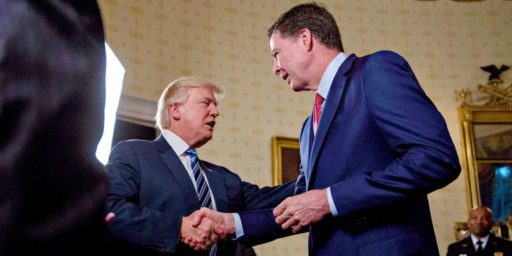Blackwater Massacre Cover-Up
The four contractors murdered, burned, and dragged through the streets of Fallujah in 2004 were sent out by a Blackwater manager despite protests that they were understaffed and unprepared, according to a report in the Raleigh-Durham News and Observer.
While tragic and perhaps even outrageous, that’s not particularly newsworthy. There are incompetent managers in all walks of life. Blackwater was founded by former Special Operations leaders and their hiring profile leans heavily toward those with similar backgrounds. Presumably, this sort of thing could have happened within our own military then; indeed, it almost surely has.
Here’s the difference:
The memos surface amid heightened congressional scrutiny of Blackwater, a private security firm based in Moyock [North Carolina], and the private security industry, which grows ever more valuable to the Pentagon. Reports last week indicate that there are now more private contractors than troops operating in Iraq. [But the reports are misleading. -ed.] Blackwater has received hundreds of millions of dollars in federal contracts.
The aftermath of the killings shows one difference between contractors and the military. Had an officer sent four lightly armed soldiers into Fallujah, he would likely have faced public scrutiny in the military justice system. In this case, the House Committee on Oversight and Government Reform has been trying to get documents such as these memos from Blackwater without success.
The families of the four men killed in the ambush — Jerry Zovko, Wesley Batalona, Scott Helvenston and Michael Teague — sued Blackwater in Wake County Superior Court in an effort to find out what happened. Blackwater countersued the estates of the four men in federal court, successfully arguing for arbitration, in which the proceedings are closed to the public and the investigation of the incident can be much more limited.
As I’ve noted several times since this incident, contractors are in a legal limbo, not subject to the UCMJ but not quite accountable under civilian law, either. Practically, one can’t expect men to sign on to work in a war zone and subject themselves to the vagaries of host nation law, especially in a murky political situation as exists in Iraq. At the same time, however, they ought to be subject to American law. The terms of their contract, though, make that difficult. That is, to say the least, problematic.
via Memeorandum



Why should someone be subject to U.S. law when they are on foreign soil?
There is a reason Blackwater hire former SOF personnel. SOF personnel are use to working in hostile territories usually undermanned and unsupported. It is the nature of the job. Anyone who is shock by that doesn’t have a clue as to what goes on and it is probably best they don’t.
Because they’re employees of the United States Government?
If there’s an employment contract drafted, signed, and presumably executed in the US, that makes the proponents subject to US law. Any civil claims that might arise from the underlying employment would then also be subject to US law.
It’s harder to make a case that criminal sanctions under US law would be proper against activities engaged in by overseas personnel. Still, these are contractors, and if the Federal Government conditions their relationship (and pay) to being subject to US criminal law, I see no reason why contractors should not be bound by it.
“Because they’re employees of the United States Government?â€
First they are employees of a contracted company of the U.S. government. The company is only subject to the contractual terms of the contract not U.S. law in total for all employees regardless of location. Of course there is the pressure to please you clients but that is business decision not legal.
One of the reason for UCMJ is to cover action of the military in area of operations that is not subject to U.S. law. However the UCMJ doesn’t apply to contractors.
Right. But, surely, that could be specified in the contract.
Right. Maybe it should, though, for contractors operating as quasi-military personnel in war zones under the aegis of the U.S. Government.
Sorry Billy I didn’t see your post before I posted but you did a better job in explaining.
It may have been specify in the contract but that in itself could be a very messy proposition. There was apparently some bad decisions made but I’m not sure what U.S. criminal law was broken in this case. Gross negligence, I believe is civil in most cases. The big problem in these sorts of operations is applying American mainland standard to non-American mainland situations.
Not sure applying UCMJ to contractors is a good idea. In part it would imply a shield from certain lawsuits even in U.S. Applying UCMJ or U.S. law to all contractors would greatly increase the U.S. contractual cost and hamper with local contracts as well. We already have plenty of policy that does that. Making it law would multiply our difficulties by ten-fold.
Remember the outcry about high fuel prices for fuel contracts before the war. That was due to policy requirement some of them B.S. that was required by U.S. and not price gauging as many politicians claimed.
Sometime the world is not perfect and one can worsen it with P.C. laden fixes.
It would be a shame if the overpaid contractors that were trained with American tax dollars and operate with almost no oversight were subject to laws of any sort.